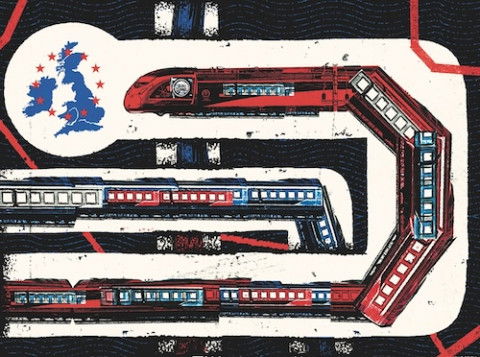
Fear, Friendship and the Channel Tunnel
November 2024 marks the 30th anniversary of the first passenger trains between London and Paris. What does the history of the Channel Tunnel tell us about Britain’s relationship with its neighbours?
A t 8.23am on the morning of 14 November 1994, crowds cheered as the first Eurostar train carrying fare-paying passengers under the English Channel left London’s Waterloo Station. Its journey was punctuated by cheers from those on board as the train entered the tunnel at Folkestone, more cheers when it emerged 18 minutes later near Calais and by spontaneous applause when it arrived into Paris two minutes ahead of schedule at 11.21am. Passengers would later describe the ‘party atmosphere’ in every carriage, although the day’s newspapers also reported the ‘bloody awful’ coffee and lack of champagne in the buffet. Many of those who travelled on Eurostar’s maiden voyage had booked their tickets years in advance, and among them were those celebrating birthdays and anniversaries, a 90-year-old Canadian former railway worker who had crossed the Atlantic to travel on the first train, author Jeffrey Archer, television presenter Jeremy Beadle and two great-grandsons of the engineer William Low, who had proposed his own Channel tunnel scheme in the 1860s.
The celebrations were underpinned by a sense of history; the train was travelling through the longest undersea tunnel on Earth, which that year had been elected by the American Society of Civil Engineers as one of the seven wonders of the modern world. References to the historic importance of the journey were rooted not simply in technological achievement, however: they also pointed to the political symbolism of forging a connection between Britain and the rest of Europe. Britain was, according to a headline in the Guardian earlier that year, ‘no longer an island’. This end to insularity was welcomed in some quarters, as adverts for Eurostar promised the possibility of jumping on a train to enjoy dinner or a shopping trip in Paris. Elsewhere, newspaper headlines exposed underlying fears, whether of rabies, as ‘Rabid foxes replace the ghost of Napoleon’ (the Scotsman) or of terrorism, as the Guardian revealed that ‘Travellers fear Chunnel Terror Attack’. A survey in November 1993 found that ‘75 per cent of Britons would not use the Channel Tunnel’, and the following year, The Times described the entire venture as ‘Dogged by Fear’. Such different interpretations of what the tunnel would mean for Britain reflected a long history of proposals, rejections and false starts. As Low’s great-grandson John remarked in 1994, the train was brilliant – but more than 100 years late.




















